2025 State Of The Executive Function Coaching Industry: Data And Statistics from EFCA Graduates
- Sean G. McCormick

- Aug 5, 2025
- 6 min read
Updated: Aug 11, 2025
This article is brought to you by the Special Educator's 10-Minute Transition Toolkit.
Find your niche, run your first session, set your price, and grab a ready-to-use coaching contract. Designed for special educators exploring executive function coaching.
Thinking of becoming an executive function coach?
You’ve probably wondered:
Can I make a real income doing this?
What’s the workload like?
Is it actually fulfilling?
We surveyed graduates of the Executive Function Coaching Academy who are actively working in the field to bring you an honest, data-driven snapshot of what this career looks like in 2025.
Want a shortcut to getting started? Download our free guide:
Now let's get into the numbers 👇
Who Becomes an Executive Function Coach?
Executive function coaching is overwhelmingly led by women.
100% of survey respondents identified as female.
Most coaches are in their 40s and 50s, with 54% between ages 45–54.
It’s not a starter career, it’s a next chapter.
When asked,
"What best describes your career before becoming an executive function coach?"
66% marked "other"
20% were special educators
14% came from school psychology, parenting, and admin roles

The 66% of coaches who marked "other" gave a diverse range of answers, some being:


If you’ve ever supported learners with ADHD or learning challenges, you’re already halfway there.
Considering this path for yourself?
The EFCA Certification Program is where these coaches started.
What Ages and Client Types Do EF Coaches Work With?
EFCA trained coaches support a range of clients including,
Middle and high school students
College students
Adults (professionals)
Parents
When it comes to client needs:
62% work with people who have ADHD
31% support clients with Autism
7% work with those who have other learning differences or executive dysfunction
Not sure who you’d want to work with yet? That’s normal.
Our transition toolkit is a great place to start.
How many clients do EF coaches typically have?
Most coaches work with 5 clients or fewer at a time.
25% handle 10–15 clients.
And some coaches are on the higher end at 25+ clients.
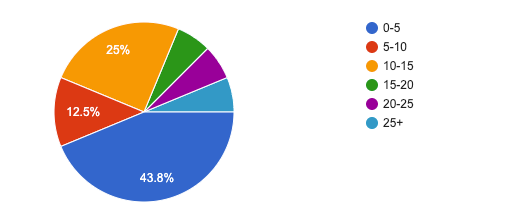
These coaches have acquired these clients in various ways, like:
Online marketing (social media or website)
Word of mouth
Partnerships with schools/businesses
For an in-depth guide on marketing and sales, check out my master article: A Guide To Marketing & Sales For Executive Function Coaches.
How Long Does It Take to Get Your First Paid Client?
50% of coaches reported landing their first paying client within 1–2 months of finishing their EFCA certification.
A significant portion already had paying clients before graduating.
Translation: if you’re active and strategic, the ramp-up is quick.
For more, check out this article from EFCA graduate, Arlene Cook, on how she landed her first client.
How Much Do Executive Function Coaches Make?
Here’s the part everyone wants to know.
Hourly Rates:
Most coaches (56%) charge between $100–$150 per hour
18.8% charge between $50–$99
18.8% charge between $150–$200
A small but real group charges $250+/hour

Monthly Income:
25% earn $2,000–$4,000/month
25% earn under $500/month (usually part-timers or just starting out)
19% earn $1,000–$2,000
19% earn $500–$1,000
3% earn $10,000+ per month
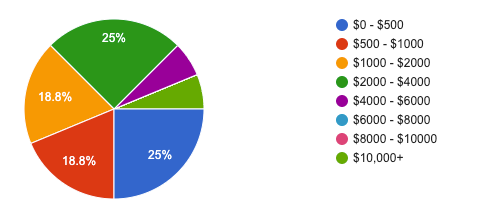
EFCA-trained coaches set their own rates, and we teach you how to price your value with confidence.
The main sources of revenue include:
One-on-one coaching (93.8%)
Workshops (12.5%)
Digital courses/products (6.3%)
Speaking engagements (6.3%)
Other (25%)
Those that chose "other", gave answers like tutoring, management, and writer.
To reach a stable income, it took coaches:
6 months - 1 year (38.5%)
1-2 years (38.5%)
More than 2 years (23.1%)
To average this all out, EFCA-trained coaches typically charge $100–$150 per hour, earn between $2,000–$4,000 per month, and reach stable income within 6 months to 2 years by combining one-on-one coaching with additional revenue streams like workshops, tutoring, and digital products.
How Much Does It Cost to Run an EF Coaching Business?
Majority of coaches (60%) said they spend between $100–$500 per month on expenses like:

Fortunately, this is a lean business.
No office rental, no inventory, and low tech costs if you keep it simple.
For a full list of the software tools I personally use as an Executive Function Coach, check out this article.
What Does a Typical Workweek Look Like?
Most EF coaches are part-time (62%).
When asked how many hours they work:
31% said 0–5 hours/week
18% said 10–15 hours
A handful reported 15–25 or more

Most (81%) work both remotely and in-person.
Zoom is by far the most common platform (87%), followed by TutorBird and Google Meet.
And don’t expect a massive team.
87% of coaches are solo operators.
That’s why EFCA’s training includes how to use systems for managing scheduling, billing, and onboarding as a solo business owner.
But, some coaches do work with a team.
Here's the inside scoop on that experience 👇
What Does Working With a Team Look Like?
Majority of EF coaches work with other executive function coaches and/or administrative assistants.
91% have a team of less than 5 employees, while the other 9% have 5-10.
When it comes to managing or communicating with their team:
80% communicate via email
20% use project management software like Slack or Asana
60% have regular meetings (in-person or virtual)
Some challenges that these coaches have faced when building their team include:
Training protocols
Legality
Most wanting to work a 9-5
Thoroughness with admin tasks
Communication issues
When asked,
What advice would you give to other executive function coaches who are considering hiring a team?
coaches gave a variety of answers, some being:
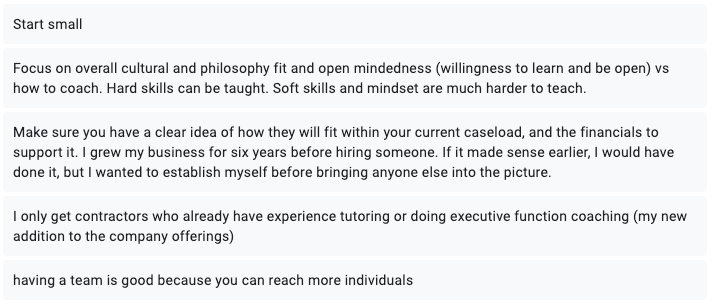
What Are The Challenges Of Running An Executive Function Coaching Business?
Running a business always comes with challenges. Some that EF coaches experience include:
Managing workload
Maintaining work-life balance
Here's some specific answers given by EFCA graduates:

If you're struggling to get your business where you want it to be, EFCA offers business coaching with Sean and a community of other EF coaches, so you can avoid the “figuring it out alone” phase.
Is Executive Function Coaching a Fulfilling Career?
On a scale of 1–5:
56% gave their job satisfaction a 5
12% gave it a 4
31% gave it a 3
Here’s some valuable advice they gave for those starting a career as an executive function coach:
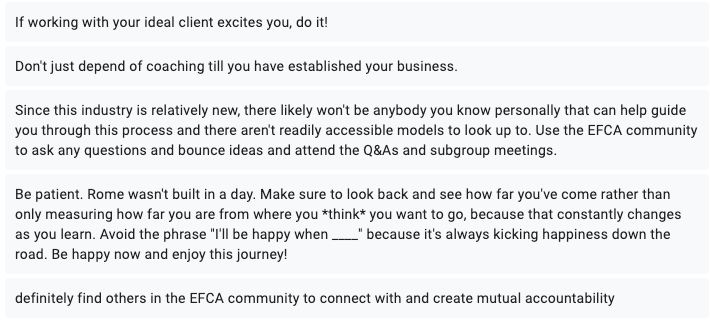

Are Executive Function Coaches Continuing to Grow Their Skills?
Almost 90% of coaches say they’re pursuing or considering further training.
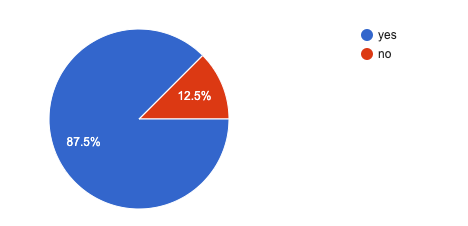
This is a profession that rewards continuous learning, not just for clients, but for you.
EFCA graduates often stay connected using our community for ongoing learning and support.
Or, they continue to one-on-one business coaching with me to help bring their goals to life and push through challenges.
Here are some areas that EFCA graduates noted they want to improve in their business:

The coaches who build profitable, fulfilling careers are the ones who stick with it, trust the process, and push past the limiting beliefs that try to tell them they can’t.
The Bottom Line
Here’s what you need to know about the Executive Function Coaching industry, based on real answers from EFCA graduates:
Most coaches are women aged 45–54 with backgrounds in education or therapy.
You can get your first client within 1–2 months, or even before you graduate.
Hourly rates range widely, but $100–$150/hour is common.
Monthly income varies, with some earning over $10K and others under $500.
Work is usually part-time, remote or hybrid, and caseloads are small but meaningful.
Marketing is the #1 challenge, don’t skip this skill.
The majority plan to continue long-term and invest in their development.
Hope this helps! 🤙🏻
Want support in starting your EF Coaching business?
Consider joining hundreds of educators and professionals who have completed our executive function coaching certification and are building profitable executive function coaching practices using their teaching experience.
You'll gain all the tools, templates, and techniques you'll need as a coach, plus you'll make new friends and have a community you can rely on to grow and learn. Learn more.
Here is one of our favorite reviews. You can read all recent reviews on this page.
If you're not sure now, that's ok. You can subscribe and get our weekly newsletter at no cost by entering your email below 👇
About Me

Hey! I'm Sean 👋
I'm a former public school special education teacher who realized that executive function skills are more important than knowing when George Washington crossed the Potomac.
Since then, I've made it my mission to teach anyone who will listen about how to develop these key life skills.
In 2020, I founded Executive Function Specialists to ensure all students with ADHD and Autism have access to high-quality online executive function coaching services. We offer online EF coaching and courses to help students and families.
Realizing I could only reach so many people through coaching, in 2021 I started the Executive Function Coaching Academy which trains schools, educators, and individuals to learn the key strategies to improve executive function skills for students.
In 2023, I co-founded of UpSkill Specialists, to provide neurodivergent adults with high-quality executive function coaching services.
When not pursuing my passions through work, I love spending time with my family, getting exercise, and expanding my brain through reading. You can connect with me on LinkedIn.
